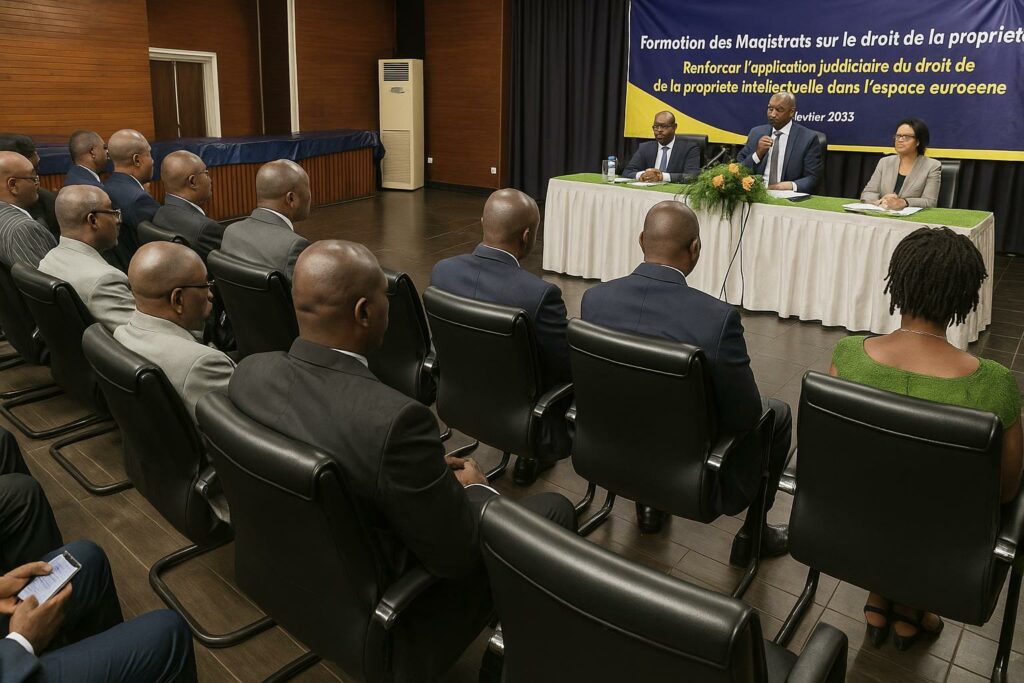Judiciary capacity-building and business climate
From the wood-panelled auditorium of the Higher School of Magistracy in Brazzaville a clear message was sent this week: securing ideas has become as strategic as protecting borders. Opening a three-day seminar devoted to intellectual property (IP) law, Minister of Industrial Development and Private-Sector Promotion Antoine Nycéphore Thomas Fylla de Saint Eudes argued that legal predictability is now a decisive variable in Congo-Brazzaville’s competitiveness matrix. “There can be no lasting growth without equity before the law,” he reminded the 55 judges enrolled in the programme, insisting that jurisprudence must keep pace with the technological leaps of a globalised market.
Strategic partnership with OAPI and OHADA
The training was organised jointly with the Ministry of Justice and the African Intellectual Property Organisation (OAPI), whose seventeen member states share a uniform IP regime. According to OAPI data, the Community recorded a 7 % increase in patent filings in 2022, a sign that inventors are gradually embracing regional protection mechanisms. Congo, for its part, intends to translate this statistical momentum into enforceable rights on the ground. The magistrates’ course therefore devoted a full module to the interaction between OAPI texts and the business law treaties of OHADA, another cornerstone of legal integration in Central and West Africa. “Our courts must be able to read these two instruments in harmony,” noted senior OAPI lecturer Dr. Alima Ndiaye, recalling recent case law from Cameroon that was later upheld by the Common Court of Justice and Arbitration (CCJA).
Economic stakes of IP enforcement in Congo
Beyond the doctrinal debates, the seminar addressed a concrete macroeconomic challenge: diversifying an oil-centric economy. The National Development Plan 2022-2026 identifies agro-industry, pharmaceuticals and digital services as priority growth sectors. Each of these relies heavily on trademarks, plant varieties or software code. The World Bank’s latest Enterprise Survey still ranks inadequate contract enforcement among the top concerns of Congolese entrepreneurs; government officials believe a specialised judiciary could reverse that perception. Economists at the University Marien-Ngouabi estimate that effective IP protection could add 0.5 percentage points to annual GDP through technology transfers and high-value exports, provided counterfeiting losses—currently assessed at 2 % of GDP by the Chamber of Commerce—are curbed through swift court orders.
Training dynamics: inside the Brazzaville seminar
Structured around case studies, the sessions demanded active participation from attendees coming from Brazzaville, Pointe-Noire, Dolisie and Owando. Mock hearings explored the thin line between fair competition and trademark dilution, while workshops on evidence-gathering dissected the mechanics of saisie-contrefaçon. “I have issued injunctions before, but never on a patent dispute; the practical exercises clarified the burden of proof,” admitted Judge Clarisse Moloki of the Pointe-Noire commercial court. The programme also included a comparative glance at European and Asian jurisprudence, with video contributions from the French National Institute of Industrial Property and the Japan Patent Office. The diversity of perspectives was hailed by Prosecutor Aristide Makosso, who underlined that “borrowing best practices does not mean surrendering sovereignty; it means refining our own standards.”
A retenir
The seminar closed with a recommendation to designate specialised IP chambers in the courts of first instance by mid-2024, echoing reforms recently adopted in Côte d’Ivoire and Rwanda. Participants further urged the digitisation of registries to reduce the average time between filing and judgment, currently estimated at fifteen months. For the private sector, such commitments signal that Congo’s legal apparatus is striving to match the ambition of its industrial transformation agenda.
Le point juridique/éco
Under Congo’s 2019 IP Code, infringement may trigger civil damages and criminal penalties of up to three years’ imprisonment. Yet only a handful of convictions have been recorded over the past decade, largely due to procedural delays. The forthcoming presidential decree on specialised benches, announced informally during the seminar, is therefore expected to streamline dockets and foster jurisprudential consistency. Investors monitoring Congo’s reform trajectory—from CEMAC peers to European pharmaceutical laboratories—will weigh the decree’s implementation when allocating R&D budgets. A credible, efficient and impartial bench may ultimately prove as persuasive as tax incentives in attracting capital.

